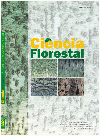
|
Ciência Florestal
Centro de Pesquisas Florestais - CEPEF, Departamento de Ciências Florestais - DCFL, Programa de Pós Graduação em Engenharia Florestal - PPGEF
ISSN: 0103-9954
EISSN: 0103-9954
Vol. 24, No. 3, 2014, pp. 771-784
|
 Bioline Code: cf14074
Bioline Code: cf14074
Full paper language: Portuguese
Document type: Review Article
Document available free of charge
|
|
|
Ciência Florestal, Vol. 24, No. 3, 2014, pp. 771-784
| en |
BRAZILIAN FOREST SEEDS: A PRECARIOUS BEGINNING, A HEADY PRESENT AND THE FUTURE, WILL IT BE PROMISING?
Ribeiro-Oliveira, João Paulo & Ranal, Marli Aparecida
Abstract
By analyzing the trajectory of forest seed sector, it is widely known the relationship between the studies on
native species and the Brazilian Forest Legislation. The Brazilian market for forest seed species is mostly
informal and there are only a few species with laboratory tests registered in the Rules for Seed Testing
(RAS). However, Law number 10,711, when ruling as to the marketing of seeds and seedlings, granted legal
subsidies to promote the formalization of the forest seeds industry. Compliance with this law is conditioned
to standardized laboratory methodologies for evaluating seed quality. For this reason, the formulation of
a supplement or specific RAS for native forest seeds seems to be near. This fact will certainly consolidate
the national seed industry sector. However, what were the paths that native forest seed science had to walk
down to reach this standardization? What are the prospects for the future relating to the native forest seed
sector? These are just some of the questions this work intends to answer, based on the perspectives of
forestry and environmental organizations, such as the Seeds Networks.
Keywords
marketing of seed; forest species; seed legislation; germination tests
|
| |
| pt |
SEMENTES FLORESTAIS BRASILEIRAS: INÍCIO PRECÁRIO, PRESENTE INEBRIANTE E O FUTURO, PROMISSOR?
Ribeiro-Oliveira, João Paulo & Ranal, Marli Aparecida
Resumo
Ao se analisar a trajetória do setor de sementes florestais, é notória a relação do fortalecimento dos
estudos sobre espécies nativas e o crescente cunho ambiental da Legislação Florestal brasileira. Apesar
de incentivado pela Legislação, o mercado de sementes nativas é muito informal e poucas são as espécies
com testes laboratoriais protocolados nas Regras para Análise de Sementes (RAS). Entretanto, a Lei nº
10.711, ao regularizar a comercialização de sementes e mudas, concedeu subsídios legais para promover
a formalização do setor de sementes florestais nativas. O cumprimento desta Lei está condicionado
à padronização de metodologias laboratoriais para análise da qualidade dessas sementes. Por isto, a
formulação de um anexo ou de uma RAS específica para sementes florestais nativas parece estar próximo.
Este fato certamente consolidará esta fatia do setor sementeiro nacional. Mas quais foram os percursos que
a ciência em sementes florestais nativas teve que transpor até esta padronização? Quais são as perspectivas
de futuro para o setor de sementes florestais nativas? Estas são apenas algumas das perguntas que este
trabalho pretende responder, embasado em perspectivas de organizações ambientais e silviculturais, como
as Redes de Sementes.
Palavras-chave
comercialização de sementes; espécies florestais; legislação de sementes; testes de germinação
|
| |
© Copyright 2014 - Ciência Florestal
Alternative site location: http://cascavel.ufsm.br/revistas/ojs-2.2.2/index.php/cienciaflorestal/index
|
|
